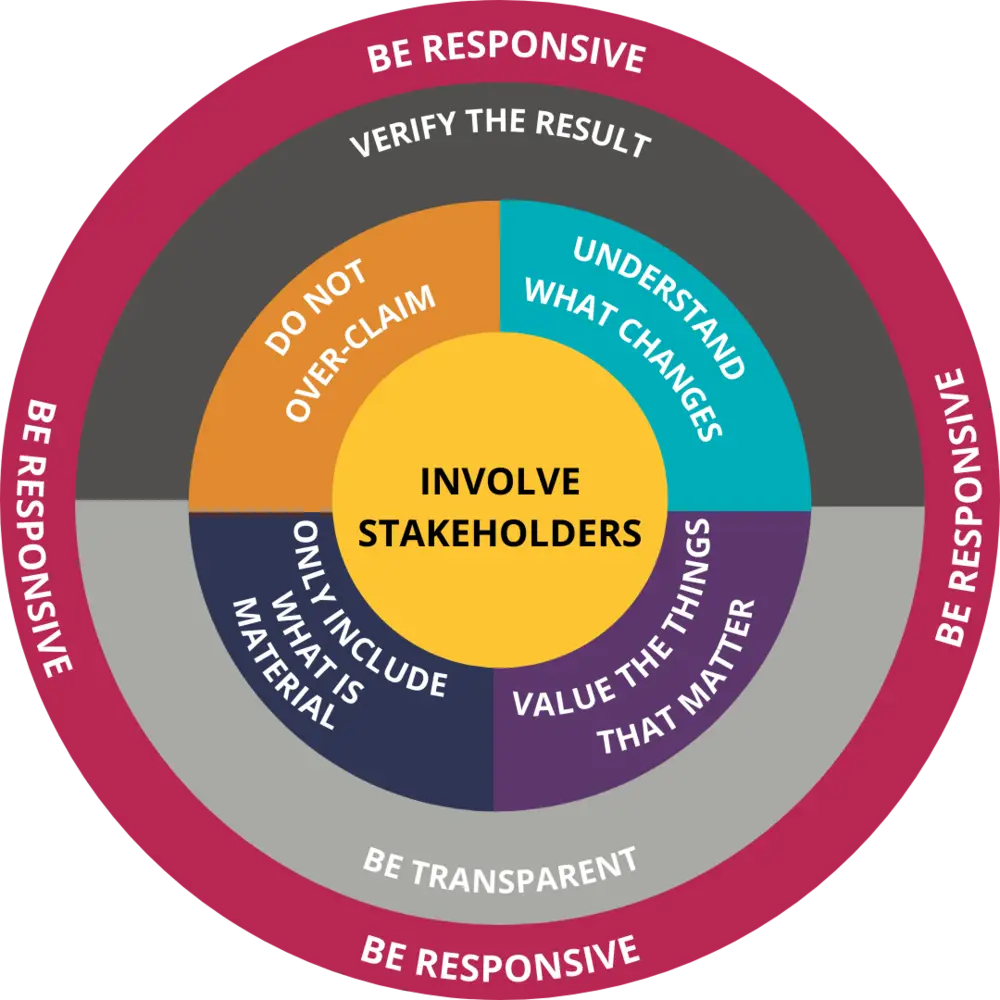Here’s an in-depth look at each SVI principle and its importance:
1. Involve Stakeholders
Involving stakeholders means actively engaging with those affected by an organisation’s activities. This can include employees, community members, customers, and other relevant parties. By understanding their perspectives and needs, organisations ensure that their social value initiatives are grounded in real-world impact and relevance. This engagement fosters a sense of ownership and inclusion among stakeholders, making the outcomes more meaningful and widely accepted.
2. Understand What Changes
This principle focuses on identifying and evaluating both positive and negative changes resulting from an organisation’s actions. It’s not just about the intended outcomes but also about unintended consequences. Understanding the full spectrum of change helps organisations to get a comprehensive view of their impact, enabling them to adjust strategies to enhance positive effects and mitigate any negative ones.
3. Value the Things That Matter
Assigning value to outcomes, even those without a direct market price, ensures that all aspects of social impact are considered. This could include improvements in well-being, social cohesion, or environmental benefits. By recognising and validating these intangible assets, organisations can create a more accurate picture of their overall contribution to society.
4. Only Include What is Material
Focusing on material information means prioritising data and outcomes that significantly influence decisions and actions. This principle ensures that the social value assessment is relevant and concise, concentrating on the most impactful areas. It helps in avoiding information overload and ensures that stakeholders can easily understand and use the information provided.
5. Do Not Overclaim
This principle emphasises the importance of honesty and accuracy in reporting social value. Organisations should only claim the value they have genuinely contributed, without exaggeration. This builds credibility and trust with stakeholders, ensuring that the reported social impact is believable and verifiable.
6. Be Transparent
Transparency involves being open about how social value is measured, reported, and communicated. Clear and honest disclosure of methodologies, data sources, and assumptions builds trust and accountability. It allows stakeholders to understand and verify the reported social value, fostering a culture of openness and reliability.
7. Verify the Result
Verification involves having social value measurements checked by independent parties to ensure accuracy and reliability. This can include audits, peer reviews, or third-party assessments. Verification adds a layer of credibility to the reported outcomes, ensuring that the social value claims are robust and trustworthy.
8. Be Responsive
Being responsive means adapting and improving based on feedback and changing circumstances. This principle encourages organisations to be flexible and proactive in refining their social value processes. Continuous improvement ensures that social value measurement remains relevant and effective, adapting to new insights and evolving stakeholder needs.
Why These Principles Matter
The principles of Social Value International are fundamental because they ensure that social value is measured and reported in a way that is meaningful, accurate, and reliable. When organisations involve stakeholders, they gain a deeper understanding of what truly matters to those affected by their actions, leading to more relevant and impactful initiatives. Understanding both positive and negative changes ensures a comprehensive view of impact, helping organisations to refine their strategies for better outcomes.
Valuing the things that matter, even those without a direct market price, ensures that all aspects of social impact are considered, leading to a more accurate picture of an organisation’s contribution to society.
Overall, these principles guide organisations in making informed decisions, building trust with stakeholders, and ensuring that their efforts genuinely improve social well-being. By following these principles, organisations demonstrate their commitment to social value and continuously enhance their contributions to society. For more detailed information, get in touch with our team.


